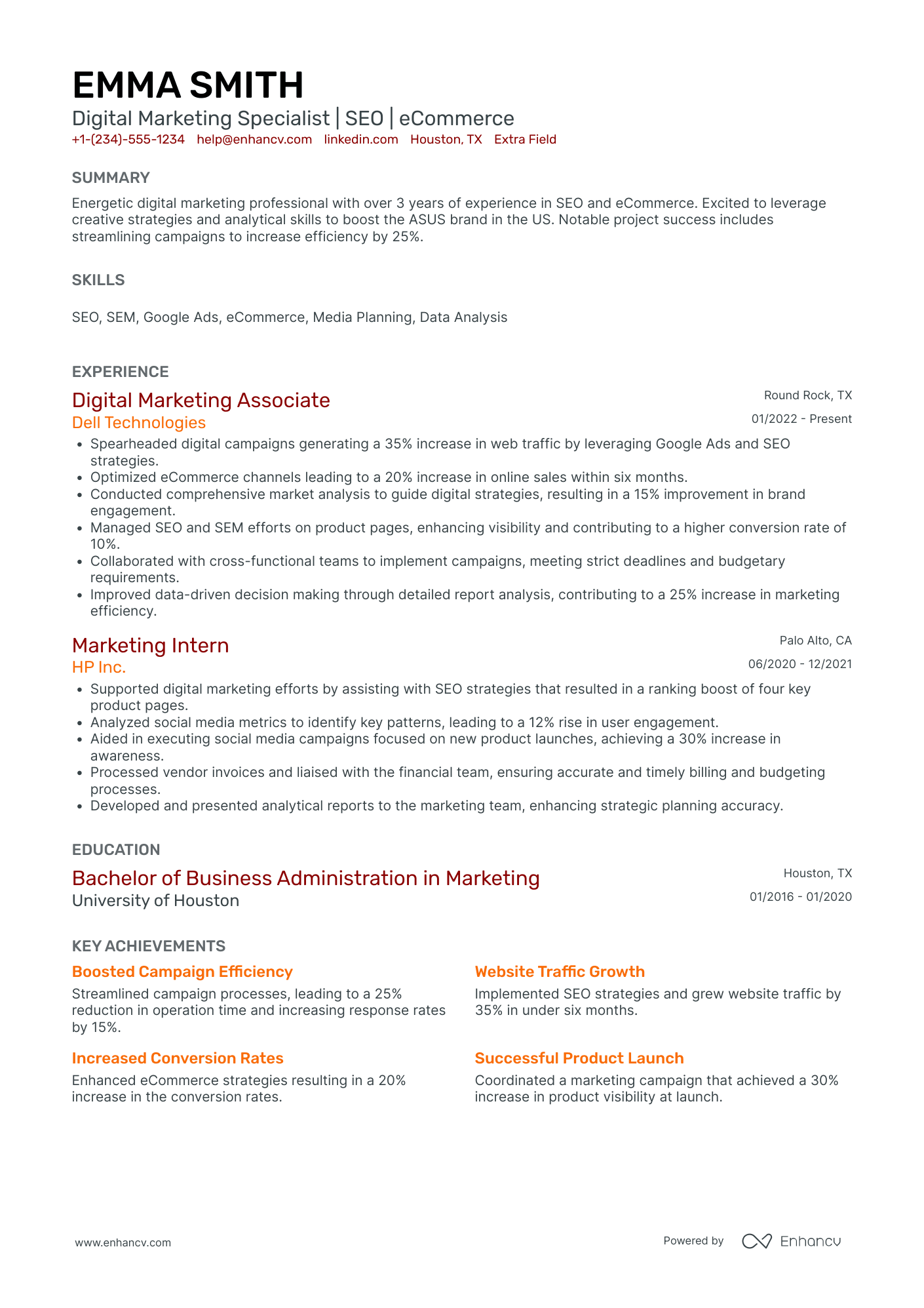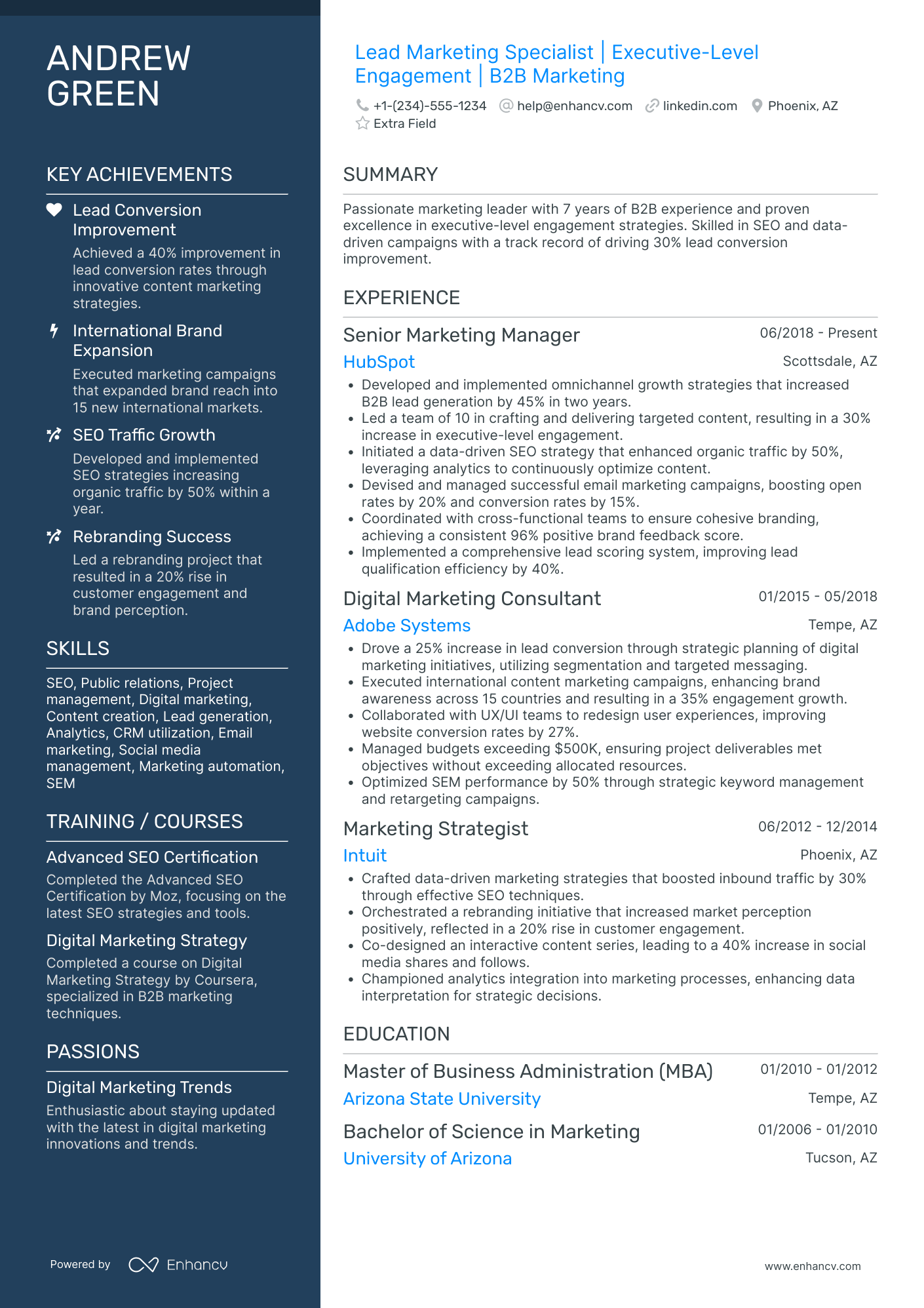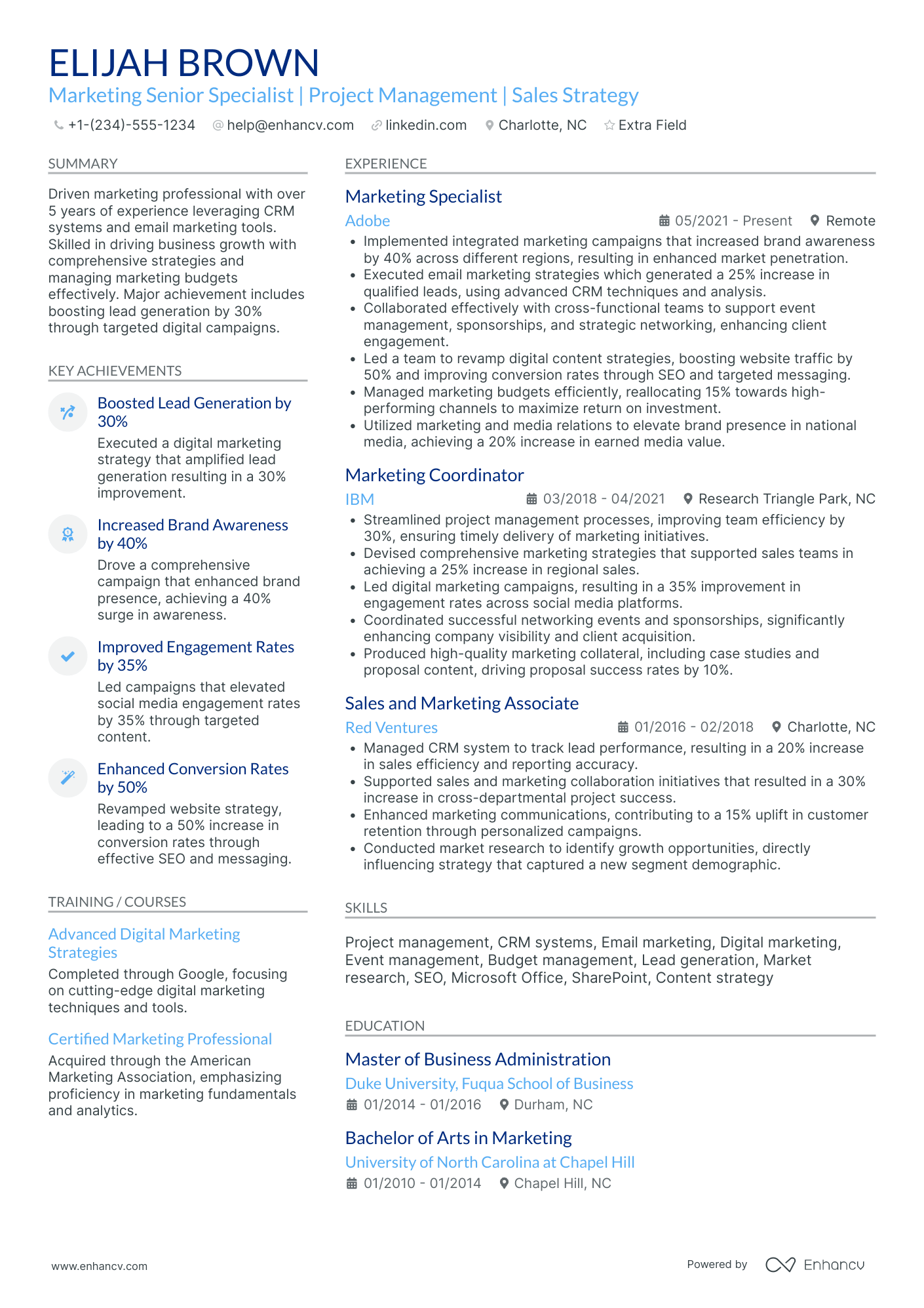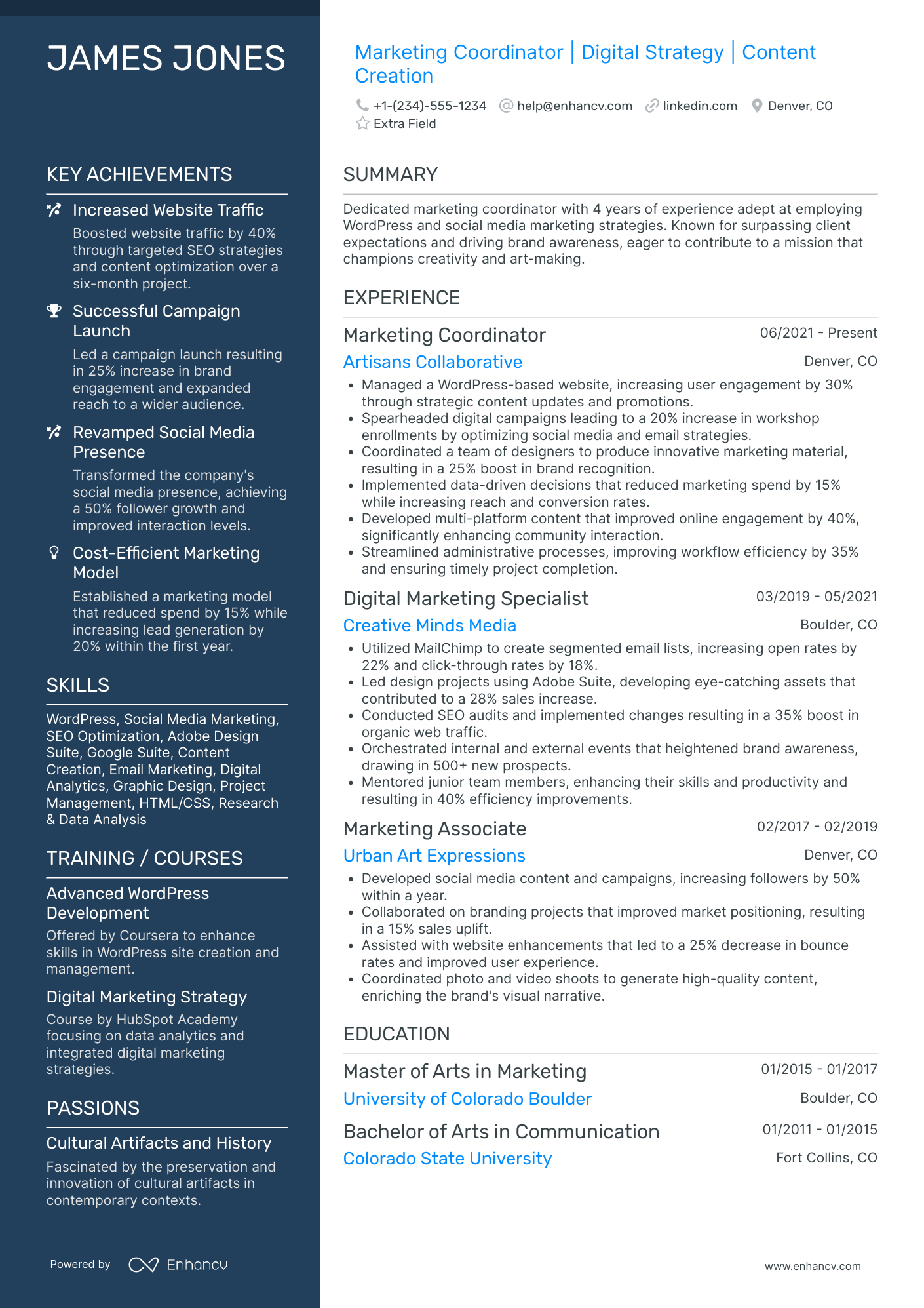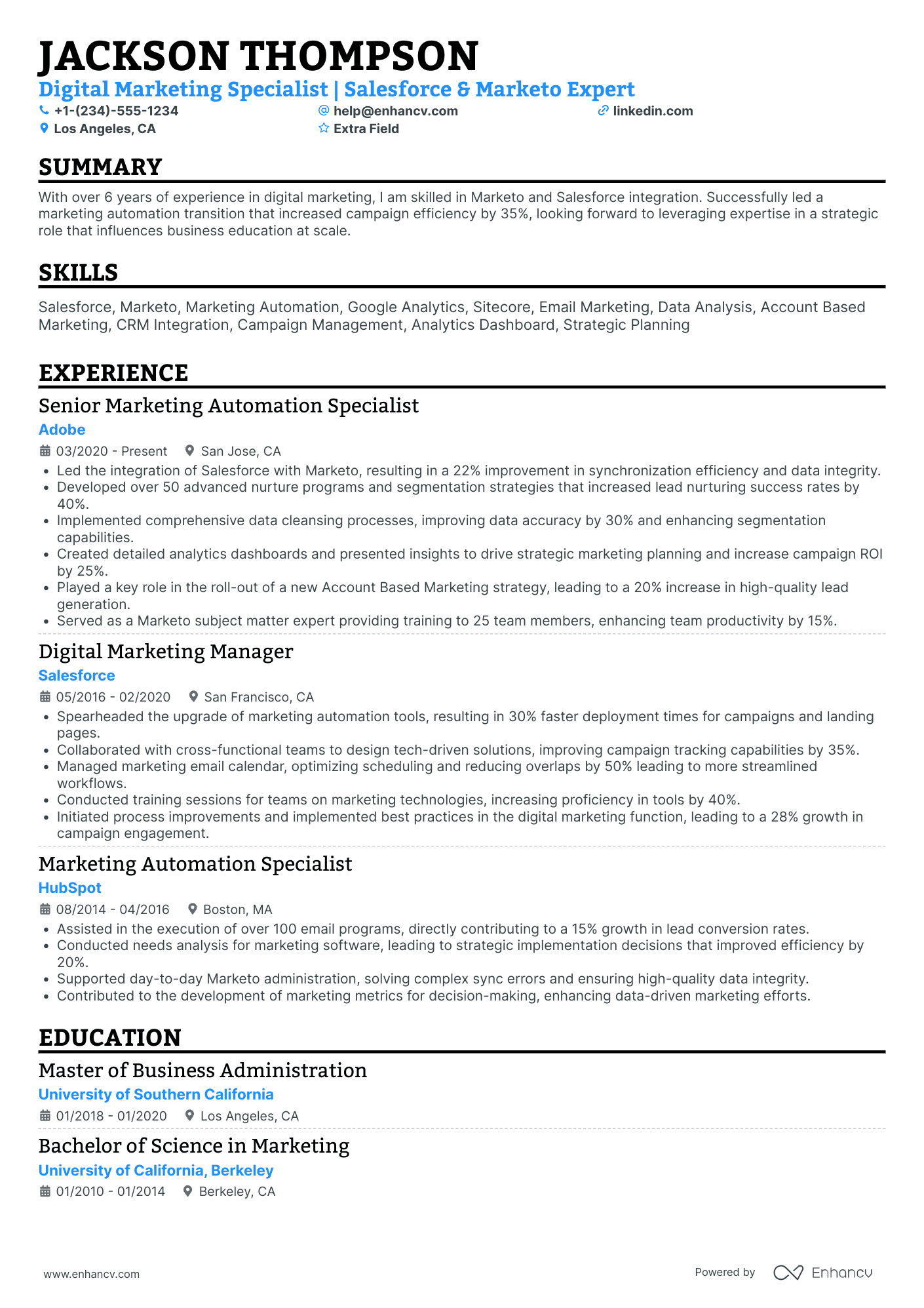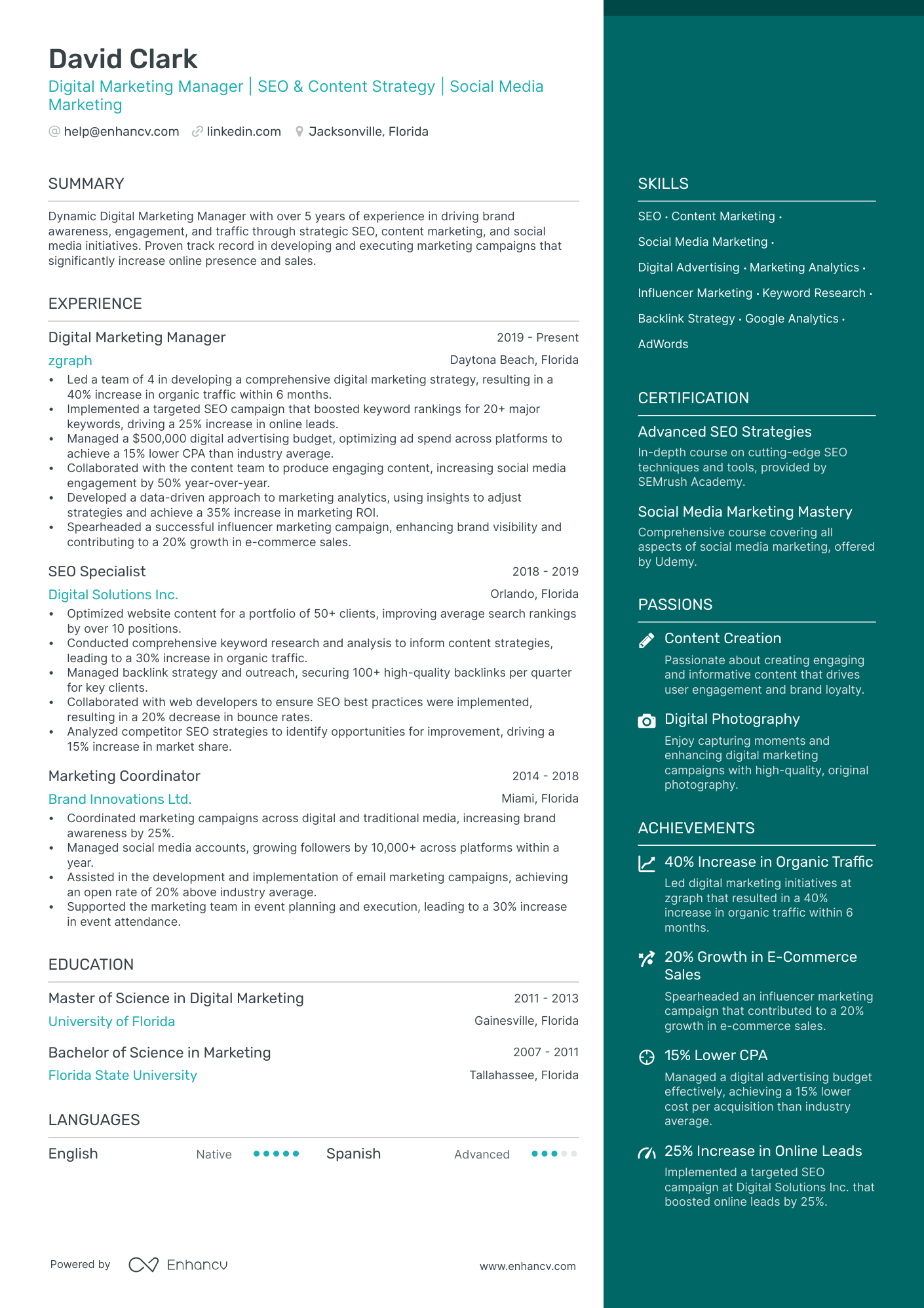Achieving a senior digital marketing position often requires a blend of ambition and expertise. However, it's important to balance confidence with humility, self-assurance, and willingness to collaborate.
Sounds difficult?
You can handle it. Enhancv will make it easier.
Ultimately, the company’s CEO is almost certainly going to be deeply involved in hiring you. All the impressive metrics in the world aren’t going to matter if the CEO doesn’t think you have the right attitude.
With that said, making a resume for a digital marketing executive position is a whole different ball game.
„A traditional executive’s resume graphics should take a backseat to data. Each resume should be curated or tailored to the person and the opportunity. You want to have a bespoke resume.“
Cydnee Dubrof, managing director of The Dubrof Group
You need to be prepared that a digital marketing executive resume will have different rules and expectations compared to all the resumes you’ve had before.
In essence, your resume example must show recruiters your wide range of skills, including a user-centric approach, a data-driven mindset, and a balance between creativity and technical expertise.
This guide helps align your achievements with your leadership goals.
Key takeaways
- Tailor your resume to reflect leadership skills, quantifiable results, and creativity balanced with technical expertise.
- Focus on showcasing measurable achievements rather than listing responsibilities.
- Design a clear and concise resume format, prioritizing professional presentation and readability.
- Emphasize essential sections like skills, experience, education, and key achievements relevant to the role.
- Choose ATS-friendly and visually appealing fonts to ensure compatibility and standout design.
Let’s review a Digital Marketing Executive resume example to underscore key elements and strategies for crafting a strong leadership profile.
Digital marketing executive resume example
For busy Digital Marketing Executives, the example resume below offers a quick, adaptable template. If you're short on time, the Enhancv resume builder makes creating a professional resume easy.
This resume does a great job featuring relevant experience, measurable results, and a broad skill set. It underlines the applicant’s qualifications and commitment to growth, making their value clear and compelling.
How to format a digital marketing executive resume
Your digital marketing executive resume should be clearly formatted to highlight your communication skills and achievements. It should make it easy for employers to see your qualifications.
At a high-level role like Digital Marketing Executive, your resume layout must be flawless. Here’s how to make it work:
Resume format
Use a reverse-chronological format to outline recent accomplishments and provide a clear view of your leadership journey.
Resume design
- As a digital marketing executive, clarity and brevity are essential, making a one-page resume ideal for most cases. However, if you have over 10 years of experience, a two-page formatcan illustrate your strategic achievements and campaigns.
- Use margins of 0.5" to 1" for a professional and readable layout.
- Opt for a two-column template to present your experience and skills in an organized manner while ensuring ATS compatibility.
- Incorporate subtle colors and choose modern fonts to create a visually appealing resume that draw attention to your expertise without overwhelming the content.
Contact information
- Include your name, job title, email, phone number, and LinkedIn profile in your resume header.
- Ensure the title reflects the executive director role you’re targeting.
- Avoid adding photos to maintain a polished, professional look.
The myth that ATS systems reject resumes without specific keywords is largely unfounded.
In 2025, most ATS systems remain basic, so success depends more on timing and personalization. Read on for tips to craft a standout digital marketing executive resume.
What does your digital marketing executive resume need?
There are a few core things your resume needs to show:
- You can achieve great results (emphasis on great, just okay results won’t cut it)
- You can communicate those results effectively
- You have a good attitude and will work well within the company culture
There are plenty of other “nice to haves” but these three things need to be your central goals.
But first, let’s expand on what results we’re talking about. One of the key differences between a digital marketing manager and an executive is a shift in focus from digital metrics to business objectives. You can and should still include traffic numbers, conversion, etc. but be prepared to discuss how those metrics fit into the big picture.
That might be done on your resume or it may be in an interview but you must be ready for that discussion.
So far so good but how to effectively present your digital marketing executive experience on your resume?
How to write your digital marketing executive resume experience
The experience section is key to your digital marketing executive resume. It shows your work history and achievements.
Tailor this resume part to the executive role by including relevant positions that demonstrate your digital marketing expertise. For unrelated roles, emphasize transferable skills that highlight your leadership potential.
Avoid listing only duties—use this section to create a compelling narrative of your value.
Need inspiration? Check out our examples!
What is a good resume experience section for a Digital Marketing Executive?
‘’Too many marketers get caught up in impressions, click-through rates, and social media sentiment. CEOs don’t care about these things. They care about sales, market share, savings/efficiency, and building great relationships with customers.’’
Damien Cummings, Global Head of Digital Marketing at Standard Chartered Bank
Cummings says it perfectly. If you simply re-use the same resume that landed you a digital marketing director job, don’t expect to be hired as an executive.
Now, let’s explore a real digital marketing executive job description for more tailored guidance.
Executive Director
Job description
As a Digital Marketing Executive, you’ll play a pivotal role in managing and executing marketing campaigns for 50+ vendors, while also elevating Midwich’s and our partners' social presence across digital platforms. Your responsibilities will include crafting targeted strategies across email marketing, organic social media, PPC, SEO and keyword research. You'll also be instrumental in measuring and reporting ROI, analysing campaign performance and sharing valuable insights with our content team to continuously optimise results.
What you will be doing in this role
- Collaborate with the Digital Marketing Executive and Content Manager to develop and execute a comprehensive digital marketing strategy, providing data-driven insights to the content team and client services, optimising ad targeting and enhancing email marketing performance.
- Work closely with client services to guide and influence brand activities, ensuring smart budget allocation and maximising ROI across campaigns.
- Assist with the analytics and reporting for digital campaigns, delivering actionable insights that drive performance improvements.
- Execute targeted email campaigns and customer outreach through PPC and sponsored ads on LinkedIn, boosting brand awareness and driving sales.
- Create compelling social media copy and strengthen brand presence by attending live events, leveraging trending topics and engaging with online communities.
- Provide the content team with templates, keyword research and optimisation guidelines to improve landing pages and digital content performance.
What you will bring to the role
- Awareness of digital marketing best practices and strategies.
- A creative approach to social media marketing, positioning Midwich as industry thought leaders while highlighting our unique company culture.
- Proven ability to interpret ROI data and analyse marketing campaign performance for continuous optimisation.
- Working knowledge of GA4 is preferable.
- Exceptional organisational skills with the ability to manage multiple projects efficiently.
- A passion for continuous learning, staying up-to-date with the latest digital marketing trends and innovations.
Take a look at this experience section tailored specifically for the job offer:
- •Managed digital marketing campaigns for 50+ clients, focusing on email marketing, social media, PPC, and SEO to drive engagement and brand visibility.
- •Increased ROI by 20% through data-driven budget allocation and optimized ad targeting strategies.
- •Developed keyword research and SEO guidelines for the content team, improving landing page performance by 15%.
- •Created and executed targeted email campaigns, boosting open rates by 25% and lead generation by 18%.
- •Produced detailed campaign analytics reports, offering actionable insights that enhanced campaign performance.
- •Strengthened social media presence by crafting engaging content and participating in live events to boost brand awareness.
This example effectively demonstrates relevant skills and achievements for a Digital Marketing Executive role, focusing on measurable outcomes and impactful contributions. It uses concise, action-oriented language to underscore a broad range of expertise while maintaining a professional tone.
What about your hard and soft skills?
They're crucial, and you should definitely include them on your resume.
How to list your hard skills and soft skills on your resume
Similar to how what you emphasize from your work experience changes when you go from marketing management to an executive position, the same applies to the skills. There’s a lot of overlap but the emphasis is a bit different. Here's how Damien Cummings, Head of Digital Marketing at Standard Chartered Bank puts it:
“Develop great presentation and communications skills. It doesn’t matter where you are in an organization, if you can’t communicate or present well, you won’t get to the top.”
Damien Cummings, Global Head of Digital Marketing at Standard Chartered Bank
These skills are important for managers but when the competition is fiercer, standards rise.
To excel as a digital marketing executive, a balance of technical expertise and interpersonal abilities is essential.
- Hard skills: Technical abilities gained through education, training, or experience, including SEO/SEM, data analysis, and proficiency in tools like Google Analytics or SEMrush.
- Soft skills: Personal attributes such as creativity, leadership, communication, problem-solving, and adaptability, all critical for success as a digital marketing executive.
In general, try to find a balance between marketing and management skills to list in your skill section.
You may even benefit from a couple of tips to make your resume stand out from the rest.
Best hard skills for your Digital Marketing Executive resume
- Search Engine Optimization
- SEM (Search Engine Marketing)
- Google analytics
- Google ads
- CMS (WordPress, Joomla)
- Email (Mailchimp, Constant Contact)
- PPC (Pay-Per-Click) management
- Data analysis
- Conversion rate optimization
- Digital campaign strategy
- Social Media
- E-commerce platforms (Shopify, Magento)
Best soft skills for your Digital Marketing Executive resume
- Leadership
- Strategic thinking
- Creativity
- Flexibility
- Communication skills
- Problem-solving
- Teamwork
- Time management
- Attention to detail
- Analytical thinking
- Empathy
- Persuasion skills
- Project management
It would be beneficial to back up your skills with certificates. This is why it is important to include at least one or two to your digital marketing resume.
How to list your certifications and education on your resume
There’s no denying that an expectation exists that an executive will have at least a university education. If you have degrees, include them in the resume, but leave off any details about GPAs or other specifics.
That said, always take statements like “Higher education required” with a grain of salt. Often, head hunters are willing to overlook a lack of higher education if you have top-notch relevant work experience. Headhunters are under tremendous pressure to find excellent candidates, so they’re not going to let you not finish a degree over a decade ago torpedo your application.
In crafting a resume for a digital marketing executive role, strategically presenting your education and certifications is key.
Let's check some specific steps.
- Start with Your Highest Degree: Begin by listing your most recent or highest educational achievement. Include the degree obtained, the institution's name, and the graduation date (or expected graduation date).
- Include Relevant Coursework: If you've taken courses directly related to digital marketing or skills pertinent to the role, mention these. This could include courses in digital marketing strategies, SEO, content marketing, etc.
- List Certifications: Digital marketing is a field that values certifications highly. List any relevant certifications you've earned, such as Google Analytics Certification, HubSpot Content Marketing Certification, or others. Include the certifying body and the date obtained.
- Professional Development Courses: If you've completed any workshops, seminars, or online courses that enhance your digital marketing skills, include these as well. These show your commitment to staying current in the field.
Education and certifications examples for a digital marketing executive
A well-crafted education section in your resume is essential because it demonstrates the foundational knowledge and specialized training you've received up to that moment. It also demonstrates your understanding of marketing principles and digital technologies.
Highlighting your commitment through the completion of a bachelor's or master's degree in marketing, digital media, or a related field, shows your dedication to mastering the intricacies of digital marketing. This education ensures employers of your capability to handle strategic roles that require both broad and specialized knowledge.
Here is a good example of what we are talking about.
- •Core Modules: Advanced Digital Marketing Strategies, SEO & SEM Mastery, Social Media Analytics
- •Honors: Graduated Magna Cum Laude
- •Specialized Coursework: In-depth Market Research Techniques, Consumer Behavior Insights, Digital Web Analytics
For a digital marketing executive aiming to enhance their resume, acquiring and listing the following certifications can significantly boost their credentials by demonstrating specialized knowledge and commitment to staying ahead in the rapidly evolving digital marketing landscape:
Best certifications for your Digital Marketing Executive resume
Describing each section of your resume accurately is crucial, but to ensure recruiters reach and read the key sections, you must capture their attention immediately with a compelling resume summary.
How to write your digital marketing executive resume summary or objective
Let's face it - crafting a compelling resume opening is challenging. However, Enhancv can help.
Keep your summary brief and impactful, ideally three sentences, for quick and easy reading. Highlight key skills and responsibilities relevant to a digital marketing executive, focusing on what the CEO values. Use targeted keywords to align your summary with the hiring criteria.
Here’s an example:
This example gives the person who reads a proper context to understand and interpret produced information. It shows a worker highly motivated and dedicated to success.
Additional sections for a digital marketing executive resume
When targeting a role like digital marketing executive, it's crucial to showcase your proficiency and achievements in the field. Including an "Awards" section on your resume, provided you have commendable awards, significantly strengthens your application. These accolades don't necessarily have to come from high-profile organizations. Even company-specific awards can make a powerful impact.
For example:
- Excellence in Content Marketing
- Outstanding Digital Marketing Leadership
- Most Effective Integrated Marketing Campaign
An Awards section enriches your resume by showcasing your outstanding accomplishments and the professional recognition you've earned, making you a more attractive candidate for executive-level positions.
You can add more additional sections such as:
- Training/Courses: Shows you keep learning and know the latest in your field.
- References: Gives employers a way to see you're good at your job from others.
- Languages: Demonstrates your ability to communicate across cultures, valuable for international roles such as digital marketing executive.
- Strengths: Lets you highlight what you're best at and match the job needs.
Conclusion
Crafting a strong digital marketing executive resume requires a focus on measurable achievements, technical expertise, and leadership skills.
With a well-structured application, you can confidently position yourself for success in this high-impact role.
Digital Marketing Executive resume examples
By Experience
